
8 minute read
Everything is Bigger in Texas
Will the biennial gambling debate finally bear fruit in the Lone Star State?
By David Rittvo
Advertisement
It’s an odd number year, which can only mean it’s time for the Texas casino expansion discussion to begin anew during the state’s biennual legislative session.
Optimism abounds in Austin, and around the state, that the legislature can make progress on passing bills to expand gaming in Texas before the session ends in May. Let’s break down those odds.
What’s Changed Since 2021


Not much and everything, depending on who you ask. One significant change is the ability of the two federally recognized tribes in Texas to operate Class II gaming machines without fear of reprisals from state officials. The Supreme Court case Ysleta del sur Pueblo v. Texas solidified their ability to operate electronic bingo, as it is not illegal in other parts of the state.
Both the Ysleta del Sur Pueblo, located near El Paso, Texas, and the Alabama Coushatta Tribe of Texas, north of Houston, now have the autonomy to operate Class II gaming regardless of the state’s rules prohibiting gaming. Both tribes could initiate a large development project to capitalize on the market just north of Houston. While not directly impactful to the state’s budget, more legal gaming in Texas could influence the pace at which legislation advances.
Casino operations in Louisiana, Oklahoma and New Mexico continue to derive a large market share from Texans, and these markets continue to grow. In Louisiana, the gaming tax revenue from the Lake Charles and Shreveport/Bossier markets has continued to create solid funding sources for the state’s various needs.
In Oklahoma, tribes on the border—mainly the Chickasaw and Choctaw Nations—have developed large-scale, world-class resorts that provide exceptional and unique guest experiences, and ample resources for the tribes to grow and prosper. The continued annual leakage of revenue and gaming tax revenue, not to mention sales, property and other related tax revenues, should motivate the Texas legislature to consider a thoughtful gaming expansion in Texas.
Governor Greg Abbott has always opposed any expansion of gaming— until now

Opponents might counter that the state budget has an unprecedented surplus and thus requires no additional funding. While that is true, the budget surplus can easily turn to deficits, and planning for those dips is vital for a state thriving and growing like Texas.
The Players
Legislative leadership is the same as in 2021, but some of their tones and tenors have evolved. Fresh off his reelection, Governor Greg Abbot has expressed support for exploring the opportunity to expand gaming while maintaining that it should be put up to the voters through a referendum.
House Speaker Dade Phelan has been more positively vocal of his support for the passage of a bill, and believes that Texas voters would pass a statewide referendum overwhelmingly. Lt. Governor Dan Patrick has continued his vocal opposition to any bill. Although quietly, he might allow a bill to be heard in the Senate if he believes widespread support exists. All three wield varying degrees of influence over any bill’s trajectory through the legislature.
The industry’s position has remained resolute with interesting, nuanced changes that could propel the legislation forward. Las Vegas Sands (LVS) continues to be the tip of the spear and lead on lobbying efforts. Their cadre of 70 lobbyists is working very hard to demonstrate the positive economic, jobs and fiscal impacts of large-scale, resort-style casino developments.
While LVS is leading the lobbying charge, other operators with eyes set on Texas are working cooperatively to spread a message of economic prosperity.
The Legislative Vehicles
Bills have been filed in both the House and Senate, and each mirrors the other. Senate Joint Resolution 17 and House Joint Resolution 97 offer similar paths to the development of large-scale resort destinations hosted in multiple Texas cities.
The Senate bill has been assigned to a committee, but a hearing date has not been set as of this writing. Currently, the House resolution is still waiting for a committee assignment. Each bill outlines the creation of a Texas Gaming Commission and provides for developing two large-scale resort developments in the Dallas and Houston metroplexes.
These four resorts would have to spend $2 billion each, and preference has been granted, through the horsemen’s involvement, to two existing tracks—Sam Houston Raceway, owned by Penn Entertainment; and Lone Star Park, owned by the Chickasaw Nation of Oklahoma.

Another resort could be located in the San Antonio/New Braunfels metropolitan area with a development budget of $1 billion. Finally, two other developments have been outlined in Corpus Christi and McCallan, tethered to existing horse track licenses in each city, with a required investment of
The addition of racetracks to the approved sites for casinos could make a big difference, including Sam Houston Raceway, owned by Penn Entertainment
$250 million each.
The proposed tax rate in all cases is 15 percent. The addition of the horsemen is a new factor this session. The hope is that by bringing them into the fray, the scope and reach of legislative support will expand into rural areas of Texas.
Both of these bills could be marked up and edited through the committee hearing process, with changes to the locations, spending protocols and tax rates likely before either bill exits committee and reaches a floor vote. It is important to note that during the 2021 session, previous bills failed to reach a full committee vote and thus did not progress to the floor.
Constituent Support
The 2023 legislative drafting has coalesced the public and the industry. The results of a University of Houston Hobby School of Public Affairs poll conducted in January 2023, after the draft bill’s release, show strong support for expanding gaming across a wide range of population groups.
Over 75 percent of Texans support the passage of the legislation. Interestingly, the poll shows support from groups who have normally been opposed to the expansion of gaming, born-again Christian and evangelical Protestants.
Summary of SRJ 17 Legislative Polling*
• 75 percent of Texans support, including 41 percent strongly supporting its passage.
• 25 percent of Texans oppose, including 13 percent strongly opposing its passage.
• 66 percent or more (roughly two-thirds) of each of the 22 Texas sociodemographic subgroups examined support its passage.
• 83 percent of Black, 77 percent of Latino, and 73 percent of white Texans support its passage.
• 78 percent of men and 72 percent of women surveyed support its passage.
• Texan generational support for its passage ranges narrowly from a high of 81 percent among millennials to a low of 69 percent among Gen Z.
• 80 percent of Texas Democrats and 72 percent of Texas Republicans support its passage.
• 69 percent of Texas born-again Christians and 61 percent of evangelical Protestants support its passage.
*Source: University of Houston, Hobby School of Public Affairs
Upon releasing the House version of the bill in January, the Chickasaw Nation voiced their approval. This is interesting, considering their ownership interests in Lone Star Horse Track and the WinStar Casino in Oklahoma, whose main source market is the Dallas metroplex.
As mentioned, including Texas horsemen has provided additional support and fodder that could propel the legislation forward. Opponents of gaming expansion in Texas continue their efforts in the state.

The Considerations
In most states where recent gaming legislation has passed, one significant impetus has been the need or desire to raise gaming tax revenues for the host state’s budget. As noted, Texas has continued to buck that need and in 2023 they are riding a raging bull of a budget surplus to the tune of $33 billion.
Due to state constitutional laws, the majority of that surplus will be saved in multiple “rainy day” funds or future spending. However, approximately $10 billion may be used this session to offset property tax increases, raise teacher salaries, and provide revenue for other statewide needs.
While the state does not need funds, a compelling argument exists to provide expanded gaming opportunities. For the past 30 years, Texans have been traveling to neighboring states, mainly Oklahoma and Louisiana, to gamble—leaking tens and hundreds of millions of gaming tax revenue dollars out of the state. Repatriating those funds could be a continued annual source of income for the state of Texas.
Further, the proposed legislation calls for $9 billion to be spent on resort development, which could create 12,000-15,000 one-time construction and related jobs, and 8,000-12,000 permanent full-time hospitality and casinorelated jobs. These jobs and spending impacts will have significant positive effects on the host cities, most notably in the Gulf Coast communities of Corpus Christi and McCallan.
Next Steps and Potential Outcomes
The process by which legislation could get both passed and enacted remains the same. The bills will get assigned a committee and a hearing could occur in each. The committee assignments will be one of the first telltale signs of potential success or imminent demise.
If a bill progresses through the committee hearing and a positive committee vote, it will reach either the House or Senate floor. Due to the nature of the bill and the state’s constitution, each body would have to approve the bill with a two-thirds majority vote. If a bill passes both bodies with the supermajority vote, the bill will move to the governor’s desk, and a statewide referendum question would be put forth to voters.
In the best-case scenario, that referendum vote could occur in November 2023. Should it pass with a majority vote in November, the state could begin setting up the Texas Gaming Commission, devising regulations and creating a license selection process. That process could take six months to a year, with the eventual license holders selected in late 2024 to early 2025. Development of the casino resorts could start soon after, with smaller operations opening in early 2026 and larger destination resorts opening in late 2026 or early 2027.
The potential outcomes include three options. (1) There could be no movement in either body of the legislature and the process would start anew in 2025, when the legislature meets again. (2) One body could pass legislation and the other could not, creating the necessary framework and progress to continue the legislation, perhaps more efficiently, in 2025. (3) Both houses could act and kick off one of the most competitive, frenzied competitions for gaming licenses in U.S. gaming history for stake in the largest untapped market in the United States.
The crystal ball determining what will happen this legislative session is still opaque; however, the potential outcomes are pretty clear. Due to the budget surplus, one of the main levers to entice legislators on the fence is off the table. However, the overwhelming public opinion polls create inter- esting fodder for their consideration.
The priorities of legislative leaders like Abbot and Patrick include fiscal and social issues that could monopolize time in committees. One central question is whether there simply will be enough time on the calendar to get casino legislation through the committee process.
Regardless of the timeline, should the Texas Legislature consider gaming expansion it could ward off revenue loss to neighboring states like Louisiana and Oklahoma. Those annual lost tax revenues could go a long way to sustained funding for various needs and projects while creating meaningful construction and ongoing jobs in the state.
The legislative session continues through May 2023, and we will provide an update to the outcome of the session.
David Rittvo is the principal at Tailored Hospitality Advisors (THA), which specializes in pre-development services, master planning, strategic partner identification, and government relation strategies focusing on the gaming and hospitality sectors. THA is currently advising clients in the Texas market.










